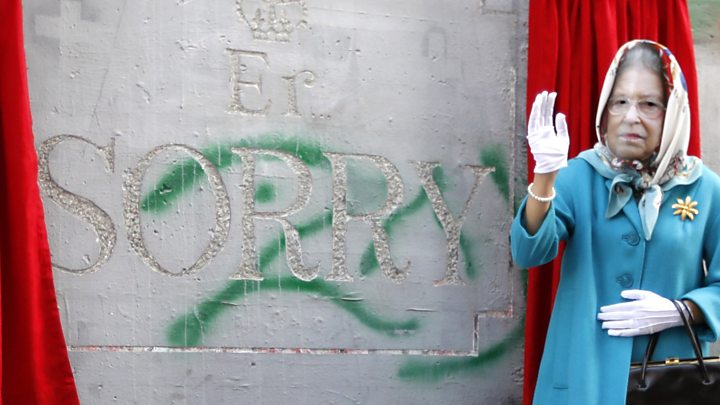Balfour Declaration: Banksy holds 'apology' party for Palestinians
The British artist Banksy has organised a "street party" in the occupied West Bank to apologise for the Balfour Declaration, ahead of its centenary.
An actor dressed as Queen Elizabeth II hosted dozens of children at the event.
She also unveiled a new work by Banksy etched into Israel's controversial West Bank barrier that said: "Er… Sorry."
The Balfour Declaration expressed the British government's support for a Jewish national home in Palestine, paving the way for Israel's creation.
Israel and Jewish communities view the pledge as momentous, while Palestinians regard it as an historical injustice.
The British government has said it will mark the anniversary "with pride" and will host at a formal dinner in London on Thursday that will be attended by Prime Minister Theresa May and her Israeli counterpart, Benjamin Netanyahu.
- My ancestor's hand in history
Banksy's tea party in Bethlehem on Wednesday was attended by children from nearby Palestinian refugee camps. Instead of paper party hats, they wore plastic helmets painted with the British flag and riddled with pretend bullet holes.
A statement by Banksy said: "This conflict has brought so much suffering to people on all sides. It didn't feel appropriate to 'celebrate' the British role in it."
"The British didn't handle things well here – when you organise a wedding, it's best to make sure the bride isn't already married."
The British government's pledge, on 2 November 1917, was made in a letter by the then Foreign Secretary Arthur Balfour to Lord Walter Rothschild, a leader of the British Jewish community.
It said the government viewed "with favour the establishment in Palestine of a national home for the Jewish people", so long as it did not "prejudice the civil and religious rights of existing non-Jewish communities".
The Balfour Declaration was the first international recognition by a world power of the right of the Jewish people to a national home in their ancestral land and formed the basis of Britain's Mandate for Palestine in 1920.
The Mandate expired on 14 May 1948 and the Jewish leadership in Palestine declared an independent Israeli state. In the Arab-Israeli war which followed, hundreds of thousands of Palestinian Arabs fled or were forced from their homes.
Palestinians, who see the Balfour Declaration as something that caused decades of suffering and deprived them of their own state on land that became Israel, have called for an apology from the UK ahead of the centenary.
Palestinian Authority President Mahmoud Abbas wrote in the Guardian newspaper on Wednesday that the act of signing the letter was not something that could be changed, but that it was something that could be "made right".
"This will require humility and courage. It will require coming to terms with the past, recognising mistakes, and taking concrete steps to correct those mistakes."
Mr Abbas said recognising a Palestinian state within the boundaries between Israel and East Jerusalem and the West Bank which existed before the 1967 Middle East war, and with East Jerusalem as its capital, could "go some way towards fulfilling the political rights of the Palestinian people".
The British government has reiterated its support for a Palestinian state alongside Israel arising through negotiations, describing the second half of the Balfour Declaration as "unfinished business".

